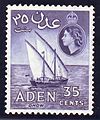Portal:Yemen
Yemen Portal


Yemen (/ˈjɛmən/ ⓘ; Arabic: ٱلْيَمَنْ, romanized: al-Yaman), officially the Republic of Yemen, is a sovereign state in West Asia. Located in the southern Arabian Peninsula, it borders Saudi Arabia to the north, Oman to the northeast, and the Indian Ocean to the south, sharing maritime borders with Eritrea, Djibouti and Somalia across the Horn of Africa. Covering roughly 528,000 square kilometres (203,861 square miles), with a coastline of approximately 2,000 kilometres (1,200 miles), Yemen is the second largest country on the Arabian Peninsula. Sanaa is its constitutional capital and largest city. Yemen's estimated population is 34.7 million, comprised mostly of Arab Muslims. It is a member of the Arab League, the United Nations, the Non-Aligned Movement and the Organisation of Islamic Cooperation.
Owing to its geographic location, Yemen has been at the crossroads of many civilisations for over 7,000 years. In 1200 BCE, the Sabaeans formed a thriving commercial kingdom that included parts of modern Ethiopia and Eritrea. In 275 CE, it was succeeded by the Himyarite Kingdom, which spanned much of Yemen's present-day territory and was heavily influenced by Judaism. Christianity arrived in the fourth century, followed by the rapid spread of Islam in the seventh century. Yemenite troops playing a crucial role in early Islamic conquests. Various dynasties emerged between the 9th and 16th centuries. During the 19th century, the country was divided between the Ottoman and British empires. After World War I, the Mutawakkilite Kingdom of Yemen was established, which in 1962 became the Yemen Arab Republic (North Yemen) following a coup. In 1967, the British Aden Protectorate became the independent People's Democratic Republic of Yemen (South Yemen), the first and only officially socialist state in the Arab world. In 1990, the two Yemeni states united to form the modern Republic of Yemen (al-Jumhūrīyah al-Yamanīyah), with Ali Abdullah Saleh serving as the first president until his resignation in 2012 in the wake of the Arab Spring.
Since 2011, Yemen has been enduring a political crisis, marked by street protests against poverty, unemployment, corruption, and President Saleh's plan to amend Yemen's constitution and eliminate the presidential term limit. By 2015, the country became engulfed by an ongoing civil war with multiple entities vying for governance, including the Presidential Leadership Council of the internationally recognized government, the Houthi movement's Supreme Political Council, and the separatist Southern Movement's Southern Transitional Council. This conflict, which has escalated to involve various foreign powers, has led to a severe humanitarian crisis. (Full article...)
Selected article -

The Queen of Sheba (Hebrew: מַלְכַּת שְׁבָא, romanized: Malkaṯ Səḇāʾ; Arabic: ملكة سبأ, romanized: Malikat Sabaʾ; Ge'ez: ንግሥተ ሳባ, romanized: Nəgśətä Saba) is a figure first mentioned in the Hebrew Bible. In the original story, she brings a caravan of valuable gifts for the Israelite King Solomon. This account has undergone extensive Jewish, Islamic, Yemenite and Ethiopian elaborations, and it has become the subject of one of the most widespread and fertile cycles of legends in Asia and Africa.
Modern historians identify Sheba with the South Arabian kingdom of Saba in present-day Yemen and Ethiopia. The queen's existence is disputed among historians. (Full article...)List of selected articles
|
|---|
Selected biography -

Ahmad bin Yahya Hamidaddin (Arabic: أحمد بن يحيى حميد الدين; June 18, 1891 – September 19, 1962) was the penultimate king of the Mutawakkilite Kingdom of Yemen, who reigned from 1948 to 1962. His full name and title was H.M. al-Nasir-li-Dinullah Ahmad bin al-Mutawakkil 'Alallah Yahya, Imam and Commander of the Faithful, and King of the Mutawakkilite Kingdom of the Yemen.
Ahmad's ruthless, arbitrary and inconsistent rule made him the subject of a coup attempt, frequent assassination attempts and eventually lead to the downfall of the kingdom shortly after his death. His enemies ranged from ambitious family members to forward-looking pan-Arabists and Republicans and from them he was given the name "Ahmad the devil." He remained surprisingly popular among his subjects, particularly the northern tribesmen from whom he had the name "Big Turban". For his remarkable ability to narrowly escape numerous assassination attempts, he was known as al-Djinn. (Full article...)List of selected biographies
|
|---|
General images -
Selected city -
Selected picture -
Selected cuisines, dishes and foods -
List of articles
|
|---|
Related portals
Religions in Yemen
Arab states
Categories
Topics
Related portals
Religions in Yemen
Arab states
Associated Wikimedia
The following Wikimedia Foundation sister projects provide more on this subject:
-
Commons
Free media repository -
Wikibooks
Free textbooks and manuals -
Wikidata
Free knowledge base -
Wikinews
Free-content news -
Wikiquote
Collection of quotations -
Wikisource
Free-content library -
Wikiversity
Free learning tools -
Wiktionary
Dictionary and thesaurus









































































